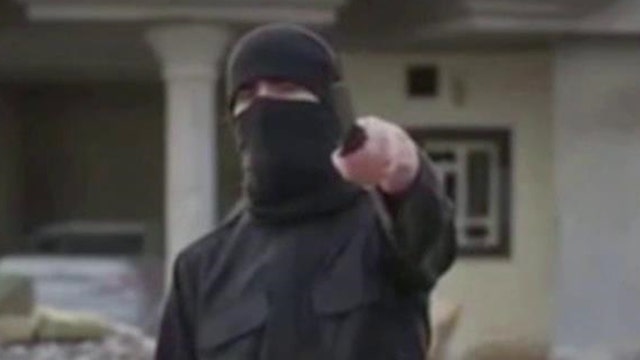ISIS releases 'revenge' video, beheads four hostages
Terrorist claims killings are in retaliation for U.S. raid
BEIJI, Iraq – A big victory over Islamic State here provided fresh ammunition for the many Iraqi Shiites who prefer Iran as a battlefield partner over the U.S., despite indications that Washington could soon intensify its battle against the extremist militants.
Shiite militias and politicians backed by Iran have claimed much of the credit for the Iraqi recapture a little over a week ago of the city and oil refinery of Beiji, about 130 miles north of Baghdad. Militia fighters danced and posed for pictures on tanks and armored cars near the bombed-out shell of the massive refinery there, Iraq’s largest.
But U.S. officers say the Iran-backed proxy militias known as Popular Mobilization Forces, or PMF, played only a supporting role. The bulk of the fighting was by Iraqi federal police and elite counterterrorism units trained by the U.S., the American officers said.
Still powerful Iraqi politicians and militia leaders have cited the yearlong operation to retake the city as evidence that Iraqis can combat Islamic State alone—or with help only of the Iran-backed militias. Some are now lobbying Prime Minister Haider al-Abadi to rely less on the U.S.-led coalition battling Islamic State and more on the PMF.
“Iraqi people in general, not only us, have started to feel that the Americans are not serious at all about the fight against Islamic State,” said Moeen Al- Kadhimi, a spokesman for the Iran-backed Badr Corps militia. “Every victory that the PMF does without the help of the Americans is a big embarrassment for the Americans.”
Following the declaration of victory at Beiji, the U.S.-led coalition, which has been conducting an air campaign against Islamic State in Iraq and Syria for more than a year, published a list of airstrikes it conducted around the city.
“It’s easy to say after the fact that ‘we did this,’ ” said Maj. Michael Filanowski, an officer for the Combined Joint Task Force, which organizes operations of the U.S.-led coalition. “But if you look at the sequence of events, it was Iraqi security forces that did the assault operations.”
He called the militias a “hold force,” meaning they secured the territory after it fell to the Iraqi forces.
The barbs reflect the geopolitical wrangling under way in Iraq. Militias often trained and supplied by Iran—and open to military assistance from Russia—have long sought a more prominent strategic role in the fight against Islamic State. As these voices grow louder, the U.S. risks losing influence in the country if an alliance including Iran and Russia gains.
The U.S. is seriously considering new measures to step up the fight against Islamic State, officials said this week, including deploying some Apache attack helicopters to Iraq. The move could require the deployment of hundreds more U.S. service members to Iraq.
After a joint U.S.-Iraqi Kurdish ground raid last week on an Islamic State prison, Secretary of Defense Ash Carter said the U.S. military would mount more such raids and provide more active support to groups, including Kurdish fighters, who can counter the extremists. He said he was prepared to put more American forces “in harm’s way.”
The raid resulted in the rescue of 69 prisoners and killed more than 20 Islamic State militants, according to the Kurdistan Regional Government. An American service member was killed—the first U.S. combat casualty in Iraq since the U.S. withdrew its forces in 2011 at the end of a decadelong war.
While that raid was welcomed by traditional U.S. allies representing Iraq’s Sunni minority, Iran-backed Shiite lawmakers and militia leaders called it American overreach, saying the U.S. never coordinated with the Iraqi government.









































